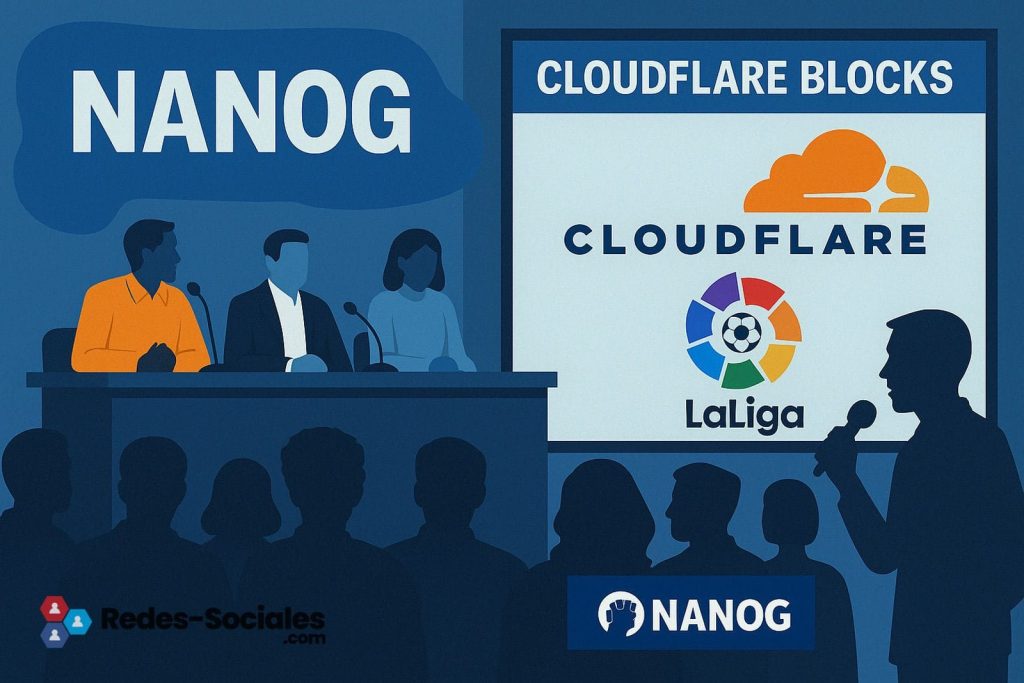The Spanish football league’s aggressive anti-piracy measures have prompted global outcry after surfacing on the North American Network Operators’ Group (NANOG), raising serious concerns over collateral censorship, CDN reliability, and internet fragmentation.
April 15, 2025 — Madrid / San Jose. The technical and ethical implications of LaLiga’s strategy to combat illegal football streaming are now at the center of an international debate, after experts and network operators weighed in during a fiery thread on the prestigious NANOG mailing list.
The trigger was a message posted by Spanish engineer Raúl Martínez, who warned that leading Spanish ISPs have begun blocking or nullrouting entire IP ranges from content delivery networks (CDNs) such as Cloudflare, Vercel, BunnyCDN, and GitHub Pages, often during live football matches. The court-authorized takedowns are based on IP lists submitted by LaLiga, targeting sites broadcasting pirated streams—but with broad and devastating unintended consequences.
“They’re taking down IPs that serve everything from ChatGPT to personal blogs and business websites, just because they share the same network infrastructure as a pirate stream,” Martínez explained.
13,000+ .es Domains Affected During Matchdays
The issue first gained national attention in Spain after a report by Bandaancha.eu, later echoed by Redes-sociales.com, revealed that more than 13.600 .es domains were being inadvertently blocked during football matches. An investigation by system administrator Jaume Pons documented that 794 IPs were rendered inaccessible on April 12 across four major CDNs—722 of them belonging to Cloudflare alone.
This included small businesses, educational portals, local services, and public websites—collateral victims of a sweeping enforcement approach that disregards domain-level precision. The blocks typically activate shortly before matches begin and are lifted hours after the final whistle.
NANOG Erupts: “Spain Is Turning Off Half the Internet”
Following Martínez’s post, responses from around the globe poured into NANOG, a central hub for global network operators. The tone quickly escalated from alarm to outright condemnation.
“This isn’t network neutrality. This is censorship by blunt force,” said Tim Burke, an operator from the U.S.
“Spain is literally switching off half the internet to stop a few pirate streams,” added [email protected], another participant.
Some technical experts criticized Cloudflare for its use of technologies like Encrypted Client Hello (ECH) and DNS over HTTPS (DoH), which they argue make domain-specific blocking nearly impossible. As a result, ISPs, under pressure to comply with court orders, resort to blocking entire IP subnets, affecting all sites hosted on those CDNs—legitimate or not.
“It’s all or nothing. That’s how Cloudflare has designed it. They made it impossible by design,” stated Constantine A. Murenin, referencing Cloudflare’s commitment to privacy-focused encryption protocols.
However, defenders of Cloudflare argued that privacy and encryption are non-negotiable, and that it’s the legal overreach of authorities, not protocol design, that’s to blame.
“Eyeball customers pay for the full internet, not ‘the internet minus every CDN the ISP doesn’t like,’” said Burke.
A European Trend? Italy’s Similar Crisis
Spain isn’t alone. Contributors noted that Italy has already implemented similar measures, but with even less oversight. There, the Serie A football league donated a content-blocking platform called Piracy Shield to the government regulator AGCOM. New laws require ISPs to block IPs and domains submitted by copyright holders—without a court order, and within 30 minutes of notification.
“In Italy, copyright holders themselves enter the IPs to block. No control, no judicial review,” said Brian Turnbow, an operator in Italy. “It’s caused mass disruption, and the CCIA has already sent a letter of protest to the European Commission.”
Cloudflare: Legal Action Already Underway
According to NANOG contributors, Cloudflare has already filed legal challenges to these blanket blockades in Spain. The company argues that such measures undermine the core functioning of the web, set a dangerous precedent for censorship, and breach the European net neutrality framework.
While the legal battle unfolds, millions of Spanish users—businesses, developers, NGOs, and institutions—find themselves relying on VPNs or left completely offline during sports events.
Is This the Internet We Want?
At the heart of the NANOG discussion lies a deeper question: Should ISPs have the power to censor the internet en masse in the name of copyright protection?
Supporters of decentralized, encrypted networks argue that selective censorship should never be a technical possibility in the first place. Critics warn that the “all or nothing” model pushes authoritarian tendencies further, enabling mass blackouts in democratic nations over commercial interests.
“You can’t have it both ways,” concluded one participant. “Either you support open protocols and accept that bad actors will hide, or you give governments the power to unplug half the internet at will.”
📚 Further Reading and Resources:
- Original news in spanish in Redes-Sociales.com
- Bandaancha.eu: Over 13,000 Spanish domains blocked due to LaLiga IP orders
- Redes-sociales.com: Analysis on LaLiga’s CDN blocking effects
- NANOG Archive: ISPs in Spain blocking CDN IPs
- TorrentFreak: LaLiga Blocks Cloudflare Again
💬 Is your website or CDN service affected during LaLiga matches?

